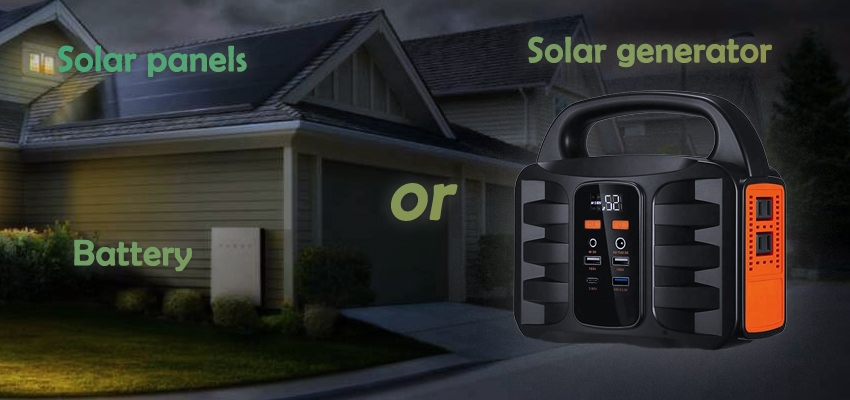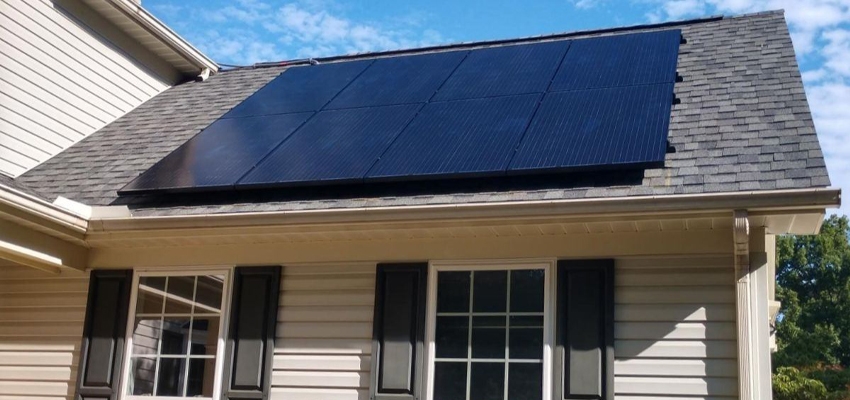For safety reasons, grid-tied solar systems usually stop generating electricity during a power outage. But if you choose an off-grid solar system or use solar panels with energy storage, you can limit the impact of a power outage. Read on to learn more about what happens to solar systems when the power goes out.
Why won’t my grid-tied solar system work during a power outage?
For safety reasons, grid-tied solar systems without batteries can't generate electricity during a power outage. Here's why:
If there's a power outage, the solar system's power inverter (the device that converts the DC power generated by the solar panels into AC power for your home) automatically switches to a mode that prevents power from returning to the grid. If the inverter doesn't do this, it could be dangerous for electrical workers who are making repairs. They need to be able to stop power from passing through the lines while they're making repairs.
So, when the inverter switches to this mode, the panels can't keep up with the home's energy needs. The inverter sends a signal to the power optimizer/photovoltaic link connected to the solar powered panels to go into a safe state and prevent the electrical load from increasing. Once power is restored to the grid, the inverter switches back to the appropriate mode and normal solar production resumes.
Can I use my off-grid solar system during a power outage?
Yes, off-grid solar systems can still produce electricity during a power outage, as long as the sun is shining on the solar panels. PV panels convert light energy into electricity, so they don't depend on the grid. This means that even if there's a grid failure or outage, the solar system will work as long as there's enough sunlight. This is great news for many areas that experience power outages during the winter months.

A solar system with a storage device (usually a battery) is even more useful in the event of a power outage.
In normal circumstances, PV panels produce electricity during the day, which can be used to power the home. If there's more electricity generated than the household can use, the excess is stored in batteries.
If there's a power outage, the solar system will automatically switch to off-grid mode (if it's set up this way). At that point, the solar panels will supply the household's electricity needs (if there's sunlight) and/or the batteries will provide the power.
If it's night or cloudy, the solar panels can't generate electricity without sunlight, so the batteries supply the household's electricity needs.
We suggest using a solar generator with a built-in battery. This provides a more reliable and independent power solution, especially in areas with unstable grids or frequent power outages. However, batteries have a limited capacity and may run out of power if the outage lasts too long or if your home power needs are too high. You can also pair your home wind turbine for hybrid power generation in case of emergency.
Off-Grid Solar Systems vs Grid-Tied Solar Systems in Power Outage
Off-Grid Solar Systems
As the name suggests, off-grid solar systems don't rely on the grid, so they can keep working even when there's a power outage. They usually have battery storage that can provide power when there's no sunlight, like at night or on cloudy days.
Off-grid systems are designed with an automatic switchover feature, so that when the grid goes down, the system automatically switches to battery-powered mode.
The power supply from an off-grid system is limited by the capacity of the batteries and how well the solar modules can generate power. If the batteries are used up and there's no sunlight, the system won't be able to provide power.
Grid-Tied Solar Systems
Grid-tied solar systems are hooked up to the grid when everything's running smoothly. The electricity they generate is either sent straight to the grid or used by the home, with any extra sold to the grid.
Most grid-tied solar systems automatically shut down during a grid outage. This is to make sure that grid maintenance crews are safe and that the solar system doesn't keep delivering power to the grid when it's back up and running.
If you want a grid-connected system to keep supplying power during an outage, you'll need to install extra equipment like battery storage and islanding protection. This lets the system switch to off-grid mode automatically in case the grid goes down. For a grid-connected system to act as a backup power source during an outage, it needs to be designed more complexly, with safety features like battery management and islanding protection.

Enjoy Off-Grid Living Through Solar
Solar panels aren't enough to power your home when the grid goes down. But when you pair them with a battery backup system, they can keep some of your home's devices running. For more products and info, visit powerhome.com. We're an online store dedicated to off-grid living, so feel free to reach out with any questions.
(1).png)
(1).png)